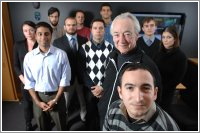
Simon Fodden (Professor Emeritus, Osgoode Hall Law School) is founder of the Canadian cooperative law blog Slaw (http://www.slaw.ca).
Five years ago, Joel Tenenbaum, now a 24-year-old graduate student at BU, may have downloaded seven tunes via a P2P network. At least that's what the Recording Industry Association of America (RIAA) alleges -- and now it wants Mr. Tenenbaum to pay them more than one million dollars in damages. What prevents this from being simply another ho-hum outrage story, one of some 30,000 suits that the RIAA has launched, threatened or settled since the "shock and awe" campaign began in 2003, is the fact that Mr. Tenenbaum now has the flamboyant Harvard law prof, Charlie Nesson, as the lead counsel on his team (see the press release in PDF) -- and teach has brought in his CyberOne class to assist. Tenenbaum has countersued the RIAA for damages.
The RIAA continues to prosecute its case against Tenenbaum and other defendants despite the fact that it announced in late December of 2008 that it will no longer use court action in its campaign against online piracy. (There's a fascinating little exchange between Nesson and Cary Sherman, President of the RIAA, on the decision to stop new lawsuits but continue those already underway.)
What makes the Nesson-Tenenbaum matter interesting for me, at least, is the team's decision to make full use of current information technology in putting forward its case. The latest move by Nesson was a request to have the trial streamed live over the internet and recorded for subsequent use. According to the report on Ars Technica, they tried to get permission to video and stream a preliminary hearing on Tuesday, but their request was denied; the request to video and stream the trial itself is as yet unresolved, and the RIAA must file its response to their request by this coming Monday.
But streaming video isn't the only tool the Tenenbaum team is using. Twitter's involved -- as you might imagine, given it's the hottest new social medium around. The latest tweet on @joelfightsback (155 followers; 214 following) from two hours ago, makes reference to the Ars Technica piece I just cited above. Professor Nesson's Twitter account is @_eon_, which he used it to tweet live during the recent hearing.
There's a CyberOne class blog, which contains a number of posts about the Tenenbaum matter. And of course Facebook is there: Joel Fights Back Against RIAA, according to which a website is coming soon and as well a way for sympathizers to donate money to the cause. As of today there are 2,150 members of the account.
To the traditionalist, all this might seem like sound and fury with small signification. I'm not so sure. I think we're seeing the way in which some lawsuits will be prosecuted in the future, and not just those in which the IP issues make IT seem appropriate somehow. The "front" of the profession is moving away from the "rear" at an ever increasing pace, when it comes to technology; and this stretching of the membership fabric is bound to lead to a certain amount of perplexity, confusion and conflict. I imagine the puzzled judge who is faced with a request to video the proceedings with a tiny Flip, or an inquiry about tweeting the trial and an offer to put her photo on the defendant's Facebook page. And these are just the technologies that have been around for a while. Tomorrow's offerings may be even more... interesting.

